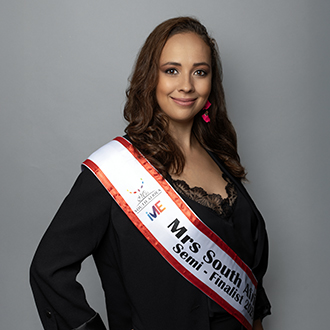News & Events
Unisa student selected as a Mrs South Africa 2025 semi-finalist
After earning her BSc in Agricultural Business Management Sciences and enrolling for her master’s, she took a bold leap into the prestigious Mrs South Africa 2025 competition — securing a spot as a semi-finalist. Now, she’s using her platform to inspire women battling mental health challenges to rise above adversity and embrace their power.

Tiana Marshman
Unisa student Tiana Marshman first took charge of her future when she registered for her BSc in Agricultural Business Management Sciences through the College of Agriculture and Environmental Sciences at the end of 2019. At the time, she was navigating personal challenges, including struggles with mental health, depression and anxiety.
“Being a wife, a mom and a full-time employee already had its own challenge, but it was time to focus on the future and on how to become an overcomer,” says Marshman.
Fast forward to the end of 2024, Marshman completed her degree and applied to further her studies by enrolling for her master’s through Unisa.
The next big decision she made was to enter the prestigious Mrs South Africa competition. She was selected as Mrs South Africa 2025 semi-finalist, which has seen her confidence grow by leaps and bounds.
When asked why she decided to enter, she responded: “I entered this pageant to gain all the necessary tools to make my voice heard as I create awareness and inspire women dealing with mental illness to rise above this disease and become the best versions of themselves.”
Having worked her way up from her first job as call centre agent to her current senior position as an office manager, she has always put herself in the “back seat”, but this year she took the bold decision to fully embrace woman empowerment.
Marshman’s journey is a testament to resilience, ambition, and the power of self-belief. As she continues to break barriers, she serves as an inspiration to fellow students and women across South Africa.
*By Tiana Marshman, Master of Science in Agriculture Student and Gugu Masinga, Communication and Marketing Specialist, College of Agriculture and Environmental Sciences, with input from ChatGPT
Publish date: 2025/03/28
